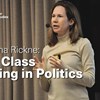beijing

Johanna Rickne: The Class Ceiling in Politics
Research seminar with Johanna Rickne, professor of Economics at SOFI, Stockholm University Abstract: Prior studies have documented that working-class individuals rarely become parliamentarians. We kno
Research seminar with Johanna Rickne: The Class Ceiling in Politics
Venue: Institutet för framtidsstudier, Holländargatan 13, 4th floor, Stockholm, or online.Research seminar with Johanna Rickne, professor of Economics at SOFI, Stockholm University.Register hereAbstracPrior studies have documented that working-class individuals rarely become parliamentarians. We know less about when in the career pipeline to parliament workers disappear, and why. We study these questions using detailed data on the universe of Swedish politicians’ careers over a 50-year period. We find roughly equal-sized declines in the proportion of workers on various rungs of the political career ladder ranging from local to national office. We reject the potential explanations that workers lack political ambition, public service motivation, honesty, or voter support. And while workers’ average high school grades and cognitive test scores are lower, this cannot explain their large promotion disadvantage, a situation that we label a class ceiling. Organizational ties to blue-collar unions help workers advance, but only to lower-level positions in left-leaning parties. We conclude that efforts to improve workers’ numerical representation should apply throughout the career ladder and focus on intra-party processes.
The indispensability of sufficientarianism
Critical Review of International Social and Political Philosophy, published online. doi.org/10.1080/13698230.2018.1479817 Abstract In this paper, I argue that sufficientarian principles are indispensabl
David Grusky: Should scholars own data? The high cost of neoliberal qualitative scholarship
Welcome to this seminar with David Grusky, Professor of Sociology at Stanford University.The seminar is jointly organized by the Institute for Analytical Sociology and the Institute for Futures Studies.D Thursday, October 6 13:00-15:00 (CET) At the Institute for Futures Studies (Holländargatan 13, Stockholm), or onlineIf qualitative work were to be rebuilt around open science principles of transparency and reproducibility, what types of institutional reforms are needed? It’s not enough to mimic open science movements within the quantitative field by focusing on problems of data archiving and reanalysis. The more fundamental problem is a legal-institutional one: The field has cut off the development of transparent, reproducible, and cumulative qualitative research by betting on a legal-institutional model in which qualitative scholars are incentivized to collect data by giving them ownership rights over them. This neoliberal model of privatized qualitative research has cut off the development of public-use data sets of the sort that have long been available for quantitative data. If a public-use form of qualitative research were supported, it would not only make qualitative research more open (i.e., transparent, reproducible, cumulative) but would also expand its reach by supporting new uses. The American Voices Project – the first nationally-representative open qualitative data set in the US – is a radical test of this hypothesis. It is currently being used to validate (or challenge!) some of the most famous findings coming out of conventional “closed” qualitative research, to serve as an “early warning system” to detect new crises and developments in the U.S., to build new approaches to taking on poverty, the racial wealth gap, and other inequities, and to monitor public opinion in ways far more revealing than conventional forced-choice surveys. The purpose of this talk is to discuss the promise – and pitfalls – of this new open-science form of qualitative research as well as opportunities to institutionalize it across the world.

Should Scholars Own Data? David Grusky About the American Voices Project
If qualitative work were to be rebuilt around open science principles of transparency and reproducibility, what types of institutional reforms are needed? It’s not enough to mimic open science movemen
Modelling in Normative Ethics
Ethical Theory and Moral Practice Abstract This is a paper about the methodology of normative ethics. I claim that much work in normative ethics can be interpreted as modelling, the form of inquiry fami
Completed: Tipping Point
A multiartistic performative sculpture to visualize the complex connection between our decisions today and the living conditions for future generations.
Individual and Collective Duties to Rescue
The ongoing refugee crisis in Europe, along with calls for intervention in conflicts in Syria and elsewhere, has pushed discussion of duties to rescue into the political spotlight. At the same time, t
Law or fist? An interview on the Social Democrats and political resistance
How do you organize political resistance? Is it reasonable to use non-democratic methods to protect a democratic society? And how do you get everyone in a large organization to agree on a common strat
Climate change and affective conflicts
Sweden has just experienced some unusually warm weeks in June. In Spain, yet another heat wave is causing alarm. In a text published in the Spanish newspaper El País, philosopher Julia Mosquera descri








